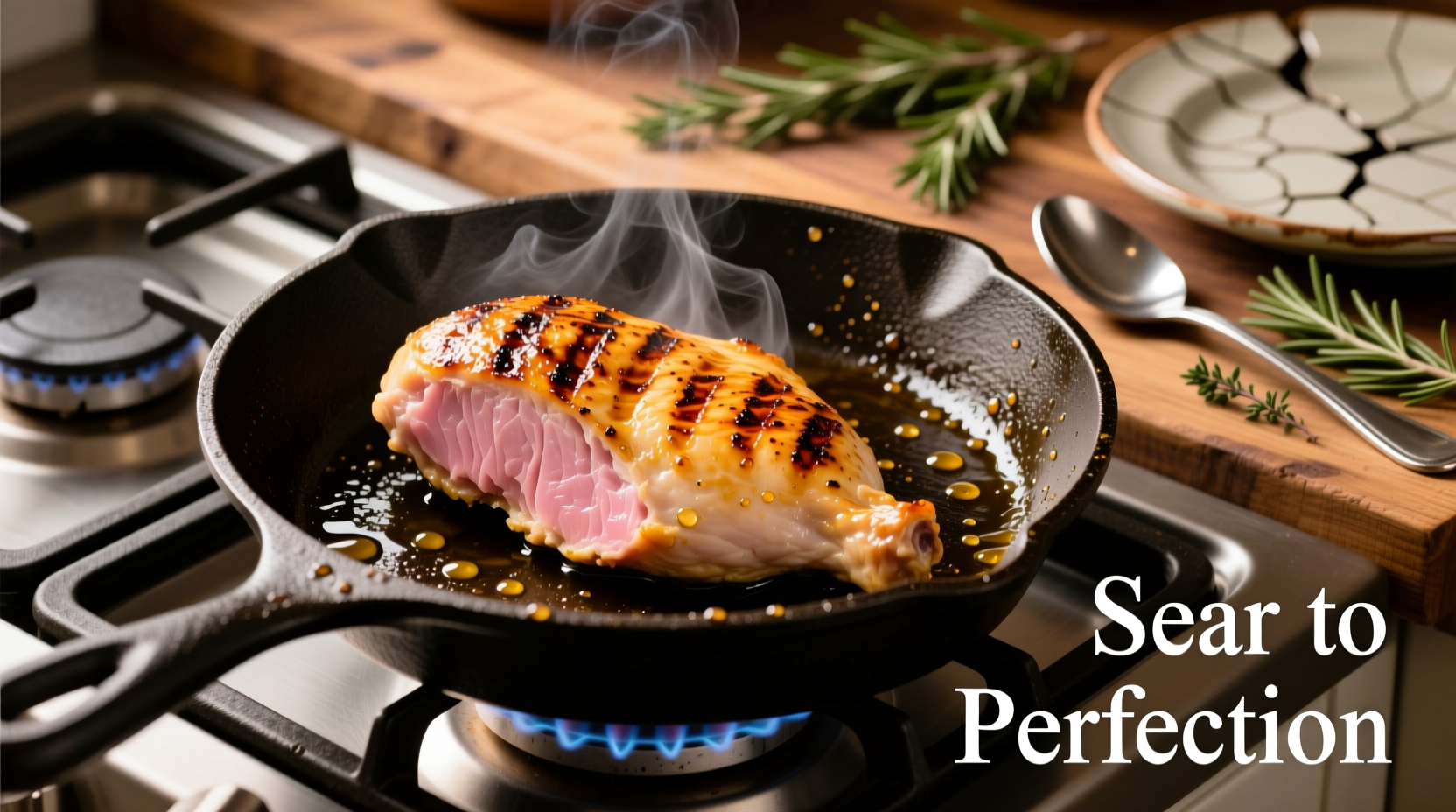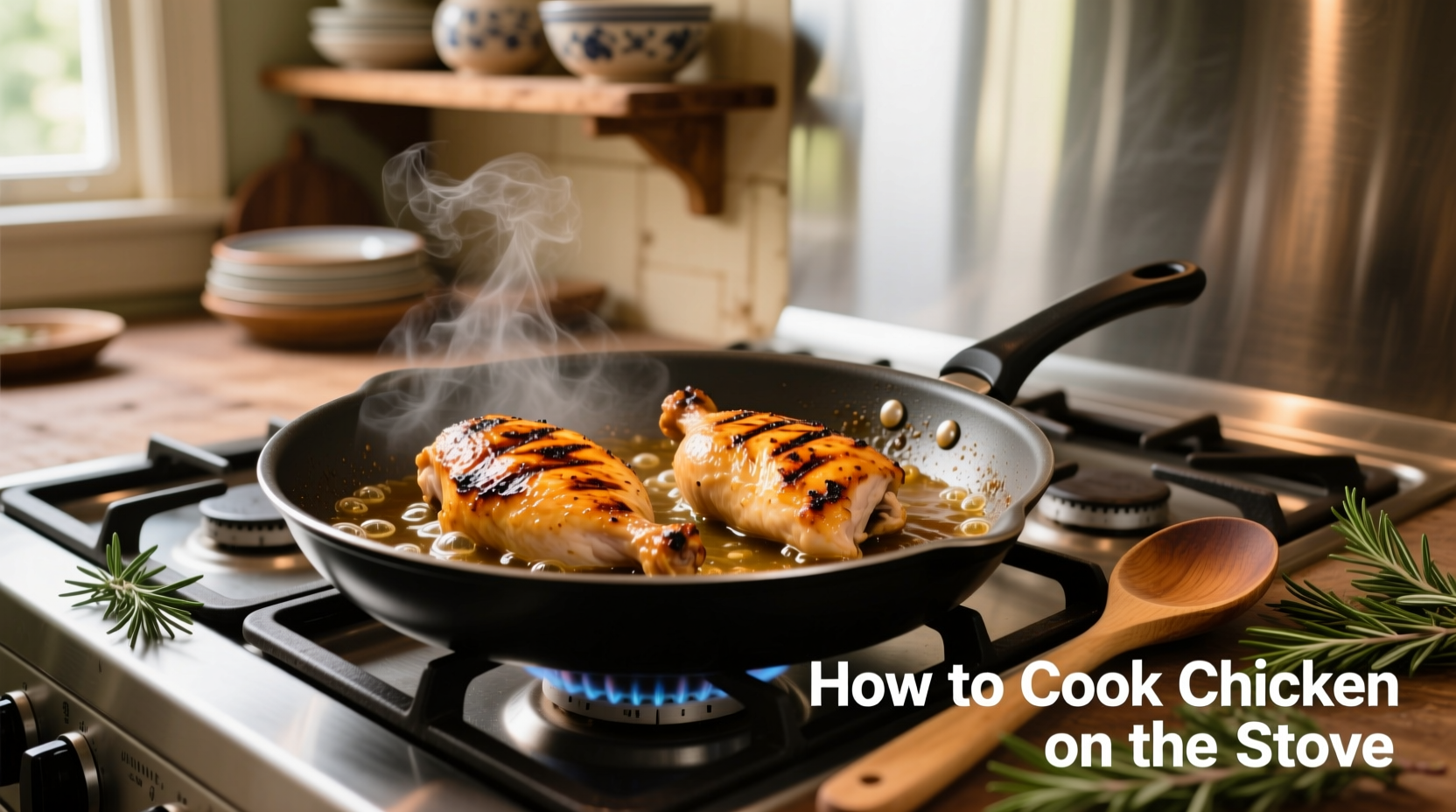Achieve perfectly cooked, juicy chicken on your stove in just 15-25 minutes with this proven method: Pat chicken dry, season generously, heat oil in a skillet over medium-high heat, cook 5-7 minutes per side until internal temperature reaches 165°F (74°C), then rest for 5 minutes before serving.
The Complete Guide to Cooking Chicken on Your Stovetop
Cooking chicken on the stove seems simple, but getting consistently juicy, flavorful results requires understanding the right techniques. After decades of testing methods in professional kitchens and home stoves, I've perfected a foolproof approach that works whether you're using breasts, thighs, or wings. This guide delivers restaurant-quality chicken every time without complicated equipment.Why Stovetop Chicken Beats Other Methods
The stovetop offers unmatched control for cooking chicken. Unlike oven baking which can dry out meat, or grilling which risks flare-ups, the direct heat of a skillet creates the perfect sear while locking in juices. Professional chefs rely on this method because it delivers:- Superior browning through the Maillard reaction
- Precise temperature control
- Faster cooking than oven methods
- Easy pan sauce creation from fond
Essential Equipment Checklist
Before you start, gather these kitchen essentials:- Heavy-bottomed skillet (cast iron or stainless steel)
- Instant-read thermometer (critical for food safety)
- Thin kitchen towels for drying chicken
- Metal spatula for flipping
- Aluminum foil for resting

Step-by-Step Cooking Process
Preparation: The Secret to Juicy Results
- Dry thoroughly: Pat chicken with paper towels until no moisture remains - this creates better browning
- Season generously: Use 1 teaspoon salt per pound of chicken, plus your preferred spices
- Bring to room temperature: Let sit 20-30 minutes before cooking for even cooking
Cooking: Precision Timing Matters
- Heat oil properly: Use 1-2 tablespoons of high-smoke point oil (avocado, canola) over medium-high heat until shimmering
- Place chicken skin-side down first: If using skin-on pieces, start skin-side down for crispy results
- Cook undisturbed: Wait 5-7 minutes before flipping to develop proper sear
- Check temperature: Insert thermometer into thickest part - remove at 160°F (71°C)
- Rest properly: Tent with foil for 5-10 minutes to redistribute juices
Chicken Cut Cooking Time Reference
| Chicken Cut | Thickness | Cook Time Per Side | Internal Temp |
|---|---|---|---|
| Boneless breast | 1 inch | 6-7 minutes | 165°F (74°C) |
| Bone-in thigh | 1.5 inches | 8-10 minutes | 175°F (79°C) |
| Drumstick | 1 inch | 10-12 minutes | 175°F (79°C) |
| Wings | 0.75 inch | 5-6 minutes | 165°F (74°C) |
Avoid These 4 Common Mistakes
Mistake #1: Moving Chicken Too Soon
When chicken sticks to the pan, resist the urge to force it free. Properly seared chicken will release naturally after 5-7 minutes. Forcing it creates uneven browning and tears the meat.Mistake #2: Skipping the Thermometer
The USDA Food Safety and Inspection Service confirms that visual cues alone can't determine doneness. Undercooked chicken risks foodborne illness, while overcooked becomes dry. An instant-read thermometer is essential for safety and quality.Mistake #3: Overcrowding the Pan
Cooking too many pieces at once drops the pan temperature dramatically, causing steaming instead of searing. Cook in batches with adequate space between pieces for proper browning.Mistake #4: Skipping the Rest Period
Resting allows juices to redistribute throughout the meat. Cutting immediately after cooking releases all those precious juices onto your cutting board.Flavor Boosters for Restaurant-Quality Results
Simple Pan Sauce Technique
After removing chicken, deglaze the pan with 1/4 cup broth or wine, scraping up browned bits. Add 2 tablespoons cold butter and swirl until emulsified. This transforms leftover fond into a professional-quality sauce in minutes.Recommended Spice Combinations
- Mediterranean: Garlic, lemon zest, oregano, and thyme
- Spicy: Paprika, cumin, cayenne, and garlic powder
- Herb Crusted: Dijon mustard, parsley, and rosemary
When Stovetop Cooking Isn't Ideal
While versatile, stove cooking has limitations. Whole chickens or very large cuts (over 1.5 inches thick) work better with oven roasting. Bone-in pieces over 1.5 inches require finishing in the oven to cook through without burning the exterior. For meal prep involving multiple large batches, oven methods prove more efficient.Storage and Reheating Guidelines
Store cooked chicken in airtight containers within 2 hours of cooking. Refrigerate for up to 4 days or freeze for up to 4 months. For best reheating results:- Skillet method: Medium-low heat with 1 tablespoon broth, covered for 3-5 minutes
- Avoid microwave: Causes uneven heating and rubbery texture
- Never reheat above 140°F (60°C):strong> Higher temperatures dry out already-cooked chicken











 浙公网安备
33010002000092号
浙公网安备
33010002000092号 浙B2-20120091-4
浙B2-20120091-4